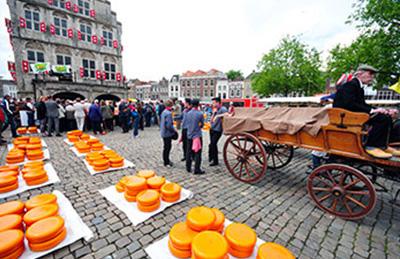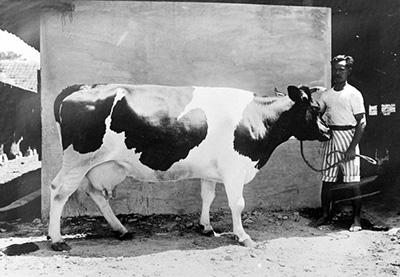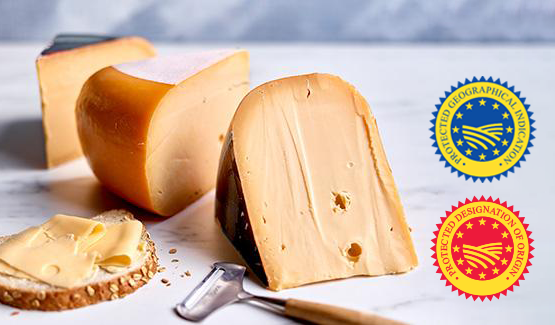Origins
Gouda is firmly rooted in the cheese-making tradition of the Netherlands, which stretches back to the middle ages and reached maturity during the Dutch Golden Age of the 17th century.
The name of the cheese derives from the famous Gouda cheese market, which can trace its origins to the 14th century. In medieval times, Dutch cities could apply for feudal rights that gave them a monopoly on the sale of certain products. In 1395, the town of Gouda acquired such a right for selling cheese in the county of Holland. As a result, the county's farmers could only sell their cheese in Gouda’s market and, as time passed, the town became synonymous with their produce.


As the popularity of the cheese grew, production spread to the province of North Holland and across the Netherlands. By the 20th century, Gouda cheese had developed into a national product of worldwide renown.
Although the cheese is now sold far beyond the bounds of Gouda’s market square, the traditions of the town’s cheese market continue to this day. On Thursday mornings from April to August, farmers stack their cheese wheels in front of Gouda’s City Hall, where they haggle and bargain with traders until a deal is struck.
Gouda is a widely recognised type of cheese. It is however important to note that, in recognition of their tastes and traditions, only Gouda Holland PGI and Noord-Hollandse Gouda PDO are protected by the European Union, ensuring origin, quality, and authenticity. Noord-Hollandse Gouda was registered as a protected designation of origin (PDO) in 1996, while Gouda Holland was registered as a protected geographical indication (PGI) in 2010.
Production
The milk used to make Gouda Holland PGI is obtained from dairy farms across the Netherlands, while Noord-Hollandse Gouda PDO is prepared only with milk from the province of Noord-Holland.

The geographical position of the Netherlands (mostly below sea level) and its maritime climate allow waves of rich green grass to grow on a bed of sandy and clay soils. Herds of cattle, often local breeds such as Holstein-Friesian, graze upon the grass pastures and the cows in the herd produce high-quality, flavourful milk.
After they have milked their cows, farmers store the milk in a cooling tank on the farm at a maximum temperature of 6°C. The milk is transported to the cheese factory within 72 hours, where it is either processed immediately or thermised (a non-pasteurising, light heat treatment) and put into cold storage for a short period of time.
The milk is then pasteurised at a temperature of at least 72°C for 15 seconds, before being curdled at approximately 30°C. Once the curds have separated from the whey, they are processed, washed, and pressed into the correct shape (traditionally a flattened wheel). The resulting cheese is then immersed in a brine bath.

After slowly soaking in the saltwater, the cheese is removed and left to mature naturally in the open air. Time and temperature play an important role in ensuring that the cheese develops its characteristic taste. The cheesemakers turn and check the cheese regularly; as it matures, a dry rind forms.
It can take more than a year for the cheese to fully mature, depending on the type of flavour desired. When young, Gouda Holland PGI and Noord-Hollandse Gouda PDO are sweet and soft; as they age, they develop a firmer texture, a deeper golden colour, and a more complex palette of aromatic flavours.
More information
Gouda Holland PGI / Noord Holland Gouda PDO – legal specifications
Protected designation of origin

